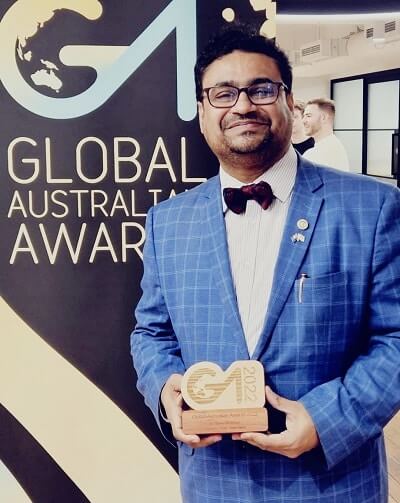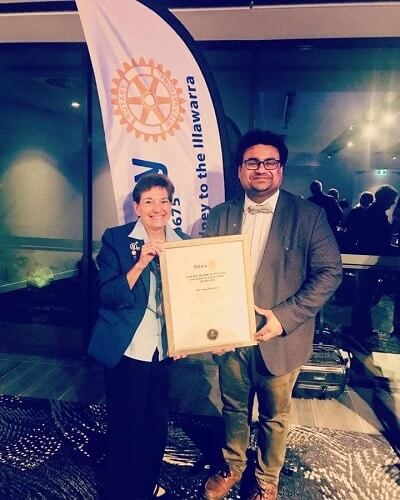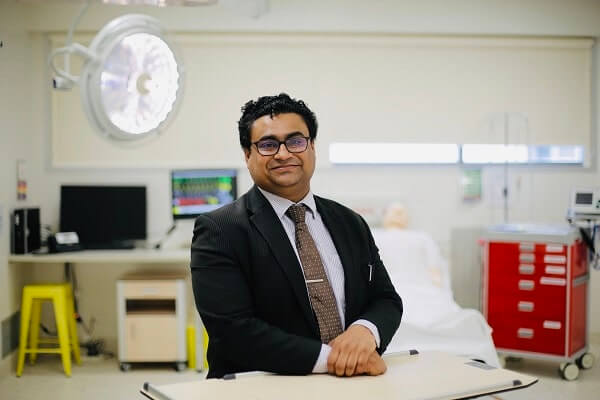Sonu Bhaskar, MD PhD PHF FANA, physician-scientist and academic neurologist has been named in this year’s 40 Under 40 Most Influential Asian Australians list.
This honour comes close on the heels of another prestigious win only weeks ago, this time for Global Talent, in the 2022 Global Australian Awards.
As Director of the Global Health Neurology Lab in Sydney, Dr Bhaskar launched the world’s first brain clot biobank, a new initiative in the prevention and treatment of strokes. It has won him international acclaim.
“The 40 Under 40 recognition, I believe, is a recognition of all migrants, whatever backgrounds they may come from,” he told Indian Link. “It shows we are making a small but meaningful impact on the larger community.”
His own work with the NSW Brain Clot Bank is ‘small’ in no measure, already creating new inroads in stroke research.

READ ALSO: SAIMA honours four doctors for meritorious work
Describing this work, he explained, “A stroke is caused by a blood clot that blocks the flow of blood to the brain. In some instances, despite testing, the cause of a stroke cannot be determined. Such strokes are called ‘cryptogenic’ strokes. Occurring 30 to 40 percent of the time, these strokes result in significant mobility and morbidity issues. My scientific curiosity suggested to me that we should study the clots retrieved from stroke patients, to find answers. When I presented this work at an international conference at Oslo, the feedback was phenomenal.”
A revolutionary treatment for stroke, launched in 2017, helped Dr Bhaskar find a way to ‘harvest’ blood clots.
The technique, called endovascular thrombectomy, involves inserting a catheter into the brain and removing the thrombus (blood clot) that’s causing the stroke. It has remarkable outcomes for patients, restoring blood flow within minutes. It must however be performed in a time-critical window, usually within six to eight hours of the onset of a stroke. (Community education has been widespread in recent years that time is critical in the treatment of stroke).
Biobanks are not uncommon in cancer research, Dr Bhaskar said; tumours removed from patients have been stored for decades. The NSW Brain Clot Bank though, is the first of its kind in the world. A second has just been launched in Liverpool, UK.
These banks, Dr Bhaskar is convinced, must have open access, as global testing is critical. “That’s how scientists and medical professionals work, not in silos. Medicine doesn’t differentiate.”

It is an attitude that underscores much of his work. Currently he is part of a number of global health initiatives, such as leading the international consortium Pandemic Health System REsilience PROGRAM (REPROGRAM), formed to champion policy development and advocacy for global pandemic preparedness.
“Experts from 25 countries are involved here to provide evidence-based guidelines for COVID, particularly long COVID, because we need different population perspectives on what the physiological drivers are. It’s going to be an important global health challenge in the future.”
He is also Chair/Co-Manager of the Berlin-based Global Health & Migration Hub Community, which guides evidence-based policy for migration in Europe, particularly in regard to mental health.
‘Global’ seems to be a term that defines his thinking, suggesting a transnational approach to understanding key issues in health and disease.
“I think we all need to be global citizens, cut out geographical barriers, and think about ourselves as humans first. The work I do as a medical professional, as a scientist, as a humanitarian – is all about community, and community is secular. The idea of diversity describes my ethics.”
Dr Bhaskar came here ten years ago and worked in Newcastle before moving to Sydney. Growing up in a middle-class family with limited resources, he loved participating in science Olympiads and competitions, and won scholarships to study in Spain, Netherlands, and Germany. “I was relentless in the pursuit of science – not only because it would help me raise my quality of life but also directly help people’s lives. My parents taught me that the joy of who we are comes from the difference we can make in people’s lives. And that has remained critical in the work I do.”
His gentle manner of speech and thoughtful conduct seem to give that away, even though they hide the “fire in the belly” that he claims drives him.
“No matter what your background, you can make a difference, as long as you have fire in your belly,” he advised. “The Asian Australian story is emerging in this country, whereas in the US it has matured. The story there with the Indian-origin business leaders, is that they never let early discrimination drag them down. As Indians we are grateful for opportunities; we are keen to make a difference, and passionate about giving back. That spirit itself will make you a leader.”
On the link between COVID and stroke: An expert clarifies
“This is an interesting hypothesis emerging, yes. COVID hijacks the immune system and possibly also triggers pathways linked to other pathophysiological hypotheses. There is, however, no data set to prove this. We need longitudinal studies, and with heterogenous populations involved. What is certain, however, is that COVID disproportionately affects those of vulnerable backgrounds, through their increased cardiovascular burdens. We’ve always known that outcomes after cancer and stroke are mediated by a postcode. We need to be mindful of social determinants in COVID as well. That will inform health planning for the future.”
READ ALSO: 7 Indian-origin women in Forbes’ ’50 Over 50′ list of 2022





